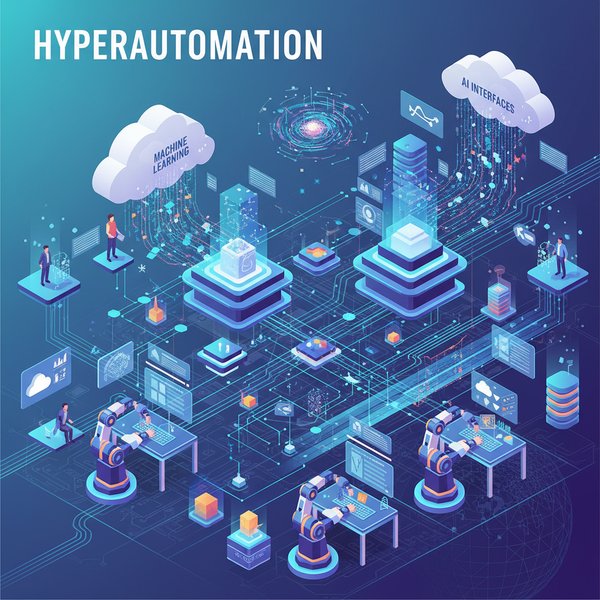
Harness Hyperautomation: Predictive Analytics in Business Planning
Understanding Hyperautomation's Transformative Role
Hyperautomation extends beyond basic automation by integrating AI, ML, and RPA to automate entire processes.
- Efficient Process Automation: Hyperautomation eliminates mundane tasks, allowing employees to engage in innovation. Studies show significant efficiency boosts and error reduction [Insert citations: Source 1, 4, 5].
- Benefits for Startups and Corporates: For startups, it reduces resource strain; for corporates, it aligns efficiencies with ambitious goals.
The Impact of Hyperautomation on Employee Satisfaction
By eliminating repetitive work, hyperautomation increases employee satisfaction and fosters creativity and strategic focus.
Harnessing Predictive Analytics in Strategy

AI boosts Strategy
Predictive analytics uses historical data to anticipate business challenges and opportunities, refining decision-making and strategy.
- Data-Driven Insights: Real-time insights sharpen strategic planning, enhancing profitability and satisfaction.
- Applications for Startups and Corporates: Startups can swiftly validate markets, and corporates can fine-tune their KPI tracking [Insert citations: Source 1, 2, 3].
Real-World Applications of Predictive Analytics
- Startups: Evaluate demand and optimize marketing strategies.
- Corporates: Predict market trends to stay ahead of competitors.
Scalability and Compliance Through Hyperautomation
Hyperautomation enables scalable growth without increasing headcount, ensuring sustainable expansion and compliance.
- Efficient Resource Allocation: Hyperautomation scales operations seamlessly, incorporating complex compliance needs [Insert citations: Source 2, 4, 5].
Enhancing Security with Consistency in Automation
Automation standardizes processes, reducing human error and increasing operational security.
- Operational Security Benefits: Automating user actions ensures consistent and reliable processes [Insert citations: Source 2, 3].
Improving Employee Experience with Automation
By alleviating mundane tasks, hyperautomation allows employees to focus on creative and strategic efforts.
- Enhanced Job Satisfaction: Automation not only optimizes processes but increases job satisfaction by freeing employees to pursue dynamic tasks [Insert citations: Source 3].
Synergistic Effects of Integrating Hyperautomation Technologies

Integrating Hyperautomation Technologies
Combining various automation tools into a cohesive strategy offers unmatched business agility and innovation.
- End-to-End Solutions: Tool integration accelerates prototyping and innovation, offering agility for both startups and corporates [Insert citations: Source 1, 3].
Customizing Hyperautomation Adoption Strategies
Understanding how different models adopt hyperautomation is crucial for successful strategies.
- Adoption Gradients: Startups are keen on experimentation, corporates focus on compliance, and agencies prioritize quality outcomes.
Conclusion
Harnessing hyperautomation and predictive analytics is essential for navigating the digital landscape efficiently. These technologies offer transformative benefits including enhanced efficiency and strategic agility.
Call-to-Action: Ready to revamp your business strategy with hyperautomation and predictive analytics? Subscribe for insights or contact us to implement these solutions.
FAQ Section
- What is hyperautomation and how does it benefit businesses?
Hyperautomation uses AI, ML, and RPA to automate complex tasks, enhancing efficiency and reducing errors.
- How does predictive analytics improve business strategy?
By leveraging historical data, predictive analytics forecasts trends, allowing refined strategic decisions.
- Why is scalability important in business operations?
Scalability enables businesses to grow without proportional increases in resources, ensuring sustainable expansion.
- What are the security benefits of automation?
Automation provides consistent operations, reducing human error and enhancing data security.
- How can startups leverage hyperautomation and predictive analytics?
Startups can optimize resources, validate markets quickly, and innovate efficiently using these technologies.
Share
Share this article with others